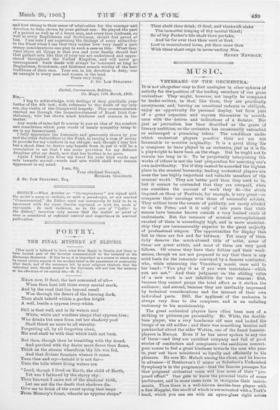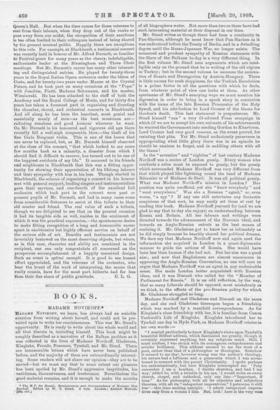MUSIC.
VETERANS' OF THE ORCHESTRA. •
IT is not altogether easy to find analogies in other spherei of activity for the'"poSition of the'leading members of our great orchestras.- They' Might, however, not' inaptly be compared to lendet-writers, in- that; like them,- they are practically anonymotts, and, barring an occasional cadenza or obbligato, enjoy no opportnnity' for personal display, but form pn.i.b of a great organism and express themselves in' accord. :ince with the' desires and indications' of a dictator. Bit just as journalism has been described as the grate of literary ambition ; so the orchestra hes occaaionally entombed or stibmergdd a promising talent: The conditiens under which orobeetral players practite' their art are nnt favourable to creative originality: It is a great thing for a compOser to have played in an orchestra, juist'aa it is feir a playwright to have beeti on the stage. But he Ought not to remain too long in it. To be perpetually interpreting the works of others is not the best preparation for asserting ;one's own individuality. Yet if they cannot be accorded the highest place in the mnsicb.1 hierarchy; leading orcheetral players are none the less highly important and valuable members of the musical world.- They ;are better paid than they used to be, but it cannot be contended that they are overpaid, when one considers the amount of work they do—the strain imposed on them at Festivals, for example, is very great—or compares their earnings with those of successful soloists. They -seldom taste the sweets of publicity, are rarely alluded -to in the Prelts; and it is only of late years that their 'names have become known outside a very limited 'circle of -enthusiasts. But the measure of musical accOmplishinent exacted of' them is exceedingly high, and in mere 'musician- ship they are immeasurably superior to the gYeat majority of professional 'singers. The opportunities for display that fall to -them are few and far betiveen.' Yet many of thenu fully deserve the mnch-abused title of artist, some of t heat ; are great' artists, and most of them are very' good fellows. Of course they have their foibles and their weak- nesses, though; we are not prepared to say that there is any solid basis for the innuendo conveyed by a famous conductor, who, while rehearsing the Venimberg music, once said to his band: "You play it as if you were teetotalers—which you are nOt.'" A-nd their judgment on the abiding volt% of a • nevi work is not infallible for two reasons : first, because they cannot gauge the total effect as it strikes the audience; and second, because they are inevitably impressed by technical considerations and the interest of their own individual parts. Still, the applause of the orchestra is always very dear to the composer, and is an unfailing testimony to his musicianship.
The great orchestral players have often been men of a striking or pietureepe personality; Mr. White, the double- bass player, was a very handsome old man and looked the image of an'old soldier"; and there was something leonine and patriarchal about the elder Wotton, one of the finest bassoon- players in Europe. Even if he has never spoken to any one of them—and they are excellent cOnipany and full of good 'stories of conductors and composers—the assiduous concert- goer comes to feel a greaticindness towards the men who year
year out have ministered so loyally and efficiently to his pleasure. He sees Mr. Mahal among. the oboes, and he knows in advance—if Beethoven's C minor or Schubert's Unfinished Symphony is in the programme—that ;the famous passages for that poignant orehestral vbice Will lose- none of their "pro- posed effect." One get i to knot,/ the personal traits of some performers, and in sortie cases even to recognise their instrti. meals. Thus there is a well-known double-bass player with s•fine-Magginii the soroll of which is-surmounted with a Turk's head, which you can see with an opera-glass right acrosa
Queen's Hall. . But when the time comes for these veterans to rest from their labours, when they drop out of the ranks or pass away from our midst, the recognition of their exertions is too often limited to their colleagues instead of being shared by the general musical public. Happily there are exceptions to this rule. For example, at Blackheath a testimonial concert was recently held in honour of Mr. Alfred Burnett, so familiar to Festival-goers for many years as the cheery, indefatigable, enthusiastic leader at the Birmingham and Three Choir meetings. But Mr. Burnett's career has many other interest- ing and distinguished entries. He played for twenty-three years in the Royal Italian Opera orchestra under the Maori of Costa, and for twenty-two years under Manna at the Crystal Palace, and he took part on many occasions at the "Pops." with Joachim, Piatti, Madame Schumann, and his master, Wieniawski. He has been attached to the staff of both the Academy and the Royal College of Music, and for thirty-five years has taken a foremost part in organising and directing the chamber, choral, and orchestral concerts in Blackheath. And all along he has been the heartiest, most genial and essentially manly of men—as the best musicians are— radiating sunshine and good Immour wherever he went. On Mr. Burnett in his honoured and vigorous old age there recently fell a well-nigh irreparable blow,—the theft of his fine Carlo Bergonzi violin. This is one of the losses that can never be replaced, but, as Mr. Burnett himself observed at the close of the concert, "that which looked to me some few months back as a calamity, a disaster from which I should find it difficult to recover, has turned out to be one of the happiest accidents of my life." It occurred to his friends and neighbours in Blackheath that this was a fitting oppor- tunity for showing their appreciation of his lifelong labours and their sympathy with him in his loss. Though started in Blackheath, the scheme of organising'a concert in his honour met with general support, leading singers and instrumentalists gave their services, and one-fourth of the excellent full orchestra which took part in the concert were past or present pupils of Mr. Burnett, and had in many cases come from considerable distances to assist at this tribute to their old master and friend. The real value of such a tribute, though we are delighted to see that on the present occasion it had its tangible side as well, resides in the sentiment of which it was the practical expression,—the spontaneous desire to make fitting recognition of a long and honourable career spent in unobtrusive but highly efficient service on behalf of the serious side of art. Benefits and testimonials are not invariably bestowed on the most deserving objects, but where, as in this case, character and ability are combined in the recipient, one can only congratulate all concerned on the prosperous accomplishment of a happily conceived design. Such an event is optimi exempli. It is good to see honest effort appreciated, and the veterans of the orchestra, who hear the brunt of the work of interpreting the music that really counts, have for the most part hitherto had far less than their due share of public gratitude. C. L. G.











































 Previous page
Previous page